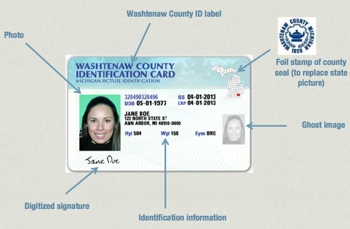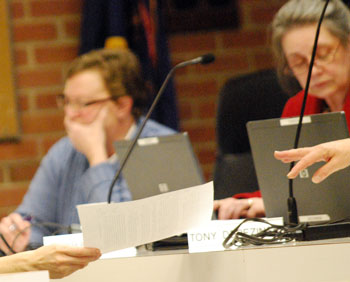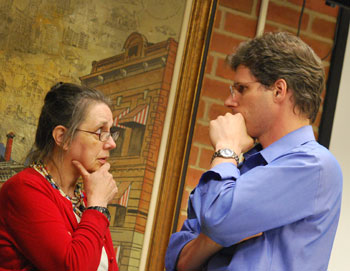County Explores Offering New ID Card
Washtenaw County board of commissioners working session (Aug. 7, 2014): A proposal to establish a county-issued ID card program is being reviewed by the board of commissioners, who were briefed on the recommendations of a task force at their August working session.
A county identification card would allow residents who don’t have a driver’s license or other government-issued photo ID to access services that require that kind of identification, like renting an apartment or opening a bank account.
The proposal indicates that cards would cost $20 or $25 each, although a waiver might be available for people who can’t afford it. An estimated 1,000 cards would be issued in the first year through the voluntary program. Those revenues would help offset the operating costs, estimated at about $35,000 for the first year. The expenses would include funding for part-time staff at the county clerk’s office, which would administer the program.
Keta Cowan of the nonprofit Synod Community Services led the Aug. 7 presentation, outlining the work of the task force in comparing similar programs in other communities nationwide – although this would be the first ID card program offered by a Michigan municipality. The task force also conducted outreach to law enforcement agencies in the county, and Cowan indicated that they were supportive of the program. Sheriff Jerry Clayton is a task force member, along with several other county officials and nonprofit leaders.
Of the five commissioners who attended the working session, all but one indicated support for the program. Dan Smith (R-District 2) had concerns, and wondered why the county should spend money to duplicate a service that the Michigan Secretary of State already provides.
Task force members described the state’s ID program as being too stringent for residents who can’t meet the requirements, but who are living in this community and need access to services.
Conan Smith (D-District 9) described it as a basic human right. It didn’t matter to him whether someone is a legal resident or an undocumented resident – “if you need to live a decent quality of life and we can facilitate that with a simple ID card, great. We can and we should.” Smith also thought it would with access to voting, which he described as a citizen’s most fundamental right – the opportunity to shape their government.
Commissioners Rolland Sizemore Jr. (D-District 5), Andy LaBarre (D-District 7) and Yousef Rabhi (D-District 8) also indicated support for the program. Rabhi served on the task force that is bringing forward the ID card recommendations.
The board is expected to consider a formal resolution to establish an ID card program, likely at a meeting later this year.
The Aug. 7 working session also included a presentation on the public health department’s strategic plan. This report focuses only on the ID card program. [Full Story]






